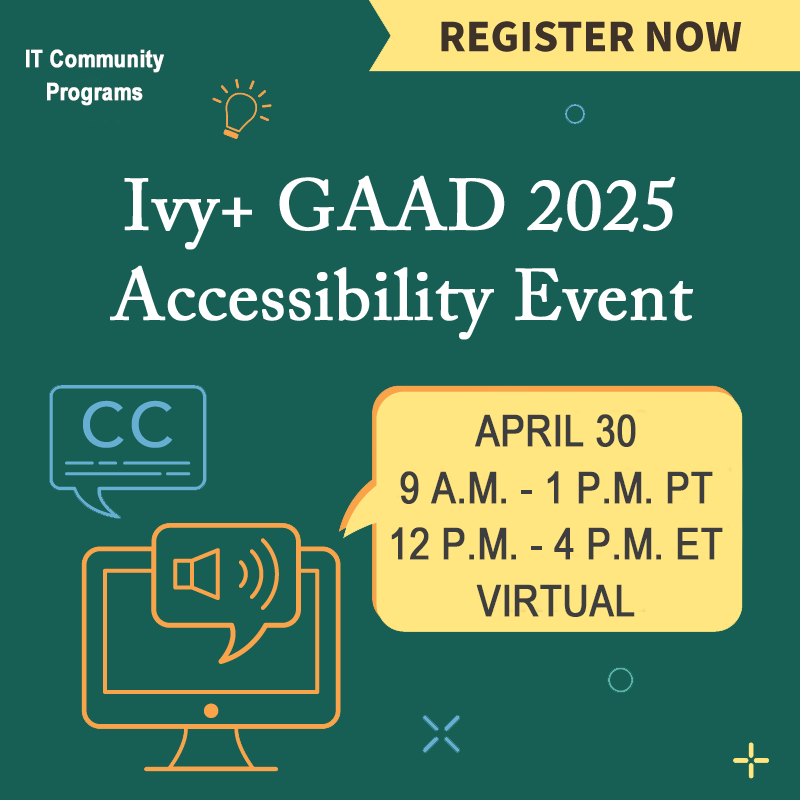
9 a.m. - 1 p.m. PT | 12 p.m. - 4 p.m. ET
Come join a virtual event to talk, think, and learn all about digital access with our peer institutions in advance of Global Accessibility Awareness Day! In collaboration with our Ivy+ colleagues, come participate in a packed agenda featuring presentations and lightning talks that highlight the practical steps you can take to make digital content more accessible.
Subject matter experts from multiple universities will share their thoughts on AI tools and strategies for creating accessible content along with key design elements that can drive users towards (or away!) from your content. Our “Ask the Experts” session will allow you to get direct advice on using platforms like Office 365 and Google Docs to create accessible documents. Join us only for a few sessions or for the entire event to explore ways to create a culture of accessibility such that all members of the campus community can engage fully with your digital resources.
To ensure the safety of all participants, we kindly request that you register AND log into Zoom using your official email address associated with your educational institution.
SESSIONS:
Note: There will be a 5-minute break after each session.
9 AM PT / Noon ET (10 minutes)
Welcome
Introductions and opening remarks
9:10 AM PT / 12:10 PM ET (50 minutes)
Session 1: Creating a Culture of Accessibility University-wide and in Academic Programs
In this panel session, fellow Ivy+ institutional leaders from Johns Hopkins University, Harvard University, and Stanford University will share how they are creating and implementing a culture of accessibility from both an institutional and instructional perspective.
- La Tonya Dyer, Executive Director, Instructional Resource Center, Advanced Academic Programs (AAP), Johns Hopkins University
- Laura Fry Kress, Lead Instructional Designer, Instructional Resource Center, AAP, Johns Hopkins University
- Michael Tran Duff, Chief Information Security and Data Privacy Officer, Harvard University
- Joyce Sackey, MD, FACP, Chief Community Engagement Officer, Clinical Professor of Medicine, & Associate Dean, Stanford University School of Medicine
- Moderator: Kathy Cahill, Digital Accessibility Coordinator, Johns Hopkins University
10:05 AM PT / 1:05 PM ET (50 minutes)
Session 2: AI Lightning Talks (10 minutes each with microbreaks between each session)
Talk #1 - AI Tools for Everyday Use (e.g., Goblin Tools Judge, ASU image description generator)
- Mike Hernandez, University of Chicago
Talk #2 - Using AI-related tools to help with code development
- Kara Gaulrapp, University of Pennsylvania
- Kevin, University of Pennsylvania
Talk #3 - Using AI to improve Alt Text for Image Descriptions
- Nick Taylor, Yale University
- Kevin Murphy, Stanford University
Talk #4 - Managing bias when using AI for Accessibility Purposes
- Auston Stamm, Stanford University
Talk #5 - Accessibility of AI Interfaces
- Derek Jackson, Harvard University
11:05 AM PT / 2 PM ET (25 minutes)
Session 3: "Ask the Experts" about Document Accessibility
This interactive panel will focus on answering questions about creating accessible documents using Microsoft Office 365 and Google Workspace. Bring your questions and get answers on making document content more accessible when using Google Workspace or Office 365 platforms.
- Rachel Hoke, Associate Director, Technology & Pedagogy, University of Pennsylvania
- Emily Baker, Senior Digital Accessibility Specialist, The University of Chicago
- Auston Stamm, Digital Accessibility Instructional Specialist, Stanford University
- Griffin Zimmerman, Document Accessibility Specialist, Princeton University
11:35 AM PT / 2:35 PM ET (25 minutes)
Session 4: "Unconference Discussions"
Come have a discussion with colleagues from other Ivy+ institutions on a variety of topics involving technology and accessibility. Participants will be able to select their preferred topic and join a Zoom breakout room with a host facilitator. Notes from each discussion will be collected and made available to all participants highlighting the topics discussed and available resources. Current topics include:
- Strategies for prioritizing remediation efforts for electronic documents
- Experiences with Editoria11y, Sa11y and other inline accessibility checkers
- Accessible data visualization
- Effective techniques for teaching digital accessibility
- Media accessibility beyond the success criteria
- Using APIs to track video captioning
- User testing with people with disabilities
- Designing robust UI elements
- Breaking through our silos
We will attempt to honor requests made after Friday, April 25, for interpreter services for specific discussion sessions.
12:05 PM PT / 3:05 PM ET (50 minutes)
Session 5: The Top 5 issues that would make me leave a website
Inaccessible web content poses significant challenges for individuals with disabilities, resulting in a poor user experience. Join us for this conversation featuring assistive technology (AT) users and accessibility experts as they discuss common issues that drive users to abandon websites.
- Pat Kogos, Director, Digital Accessibility, University of Chicago
- Erich Manser, Digital Accessibility Consultant, Harvard University
- Jose Martinez, Digital Accessibility Supervisor and Trusted Tester, Access Living, Chicago
12:50 PM PT / 3:50 PM ET (10 minutes)

